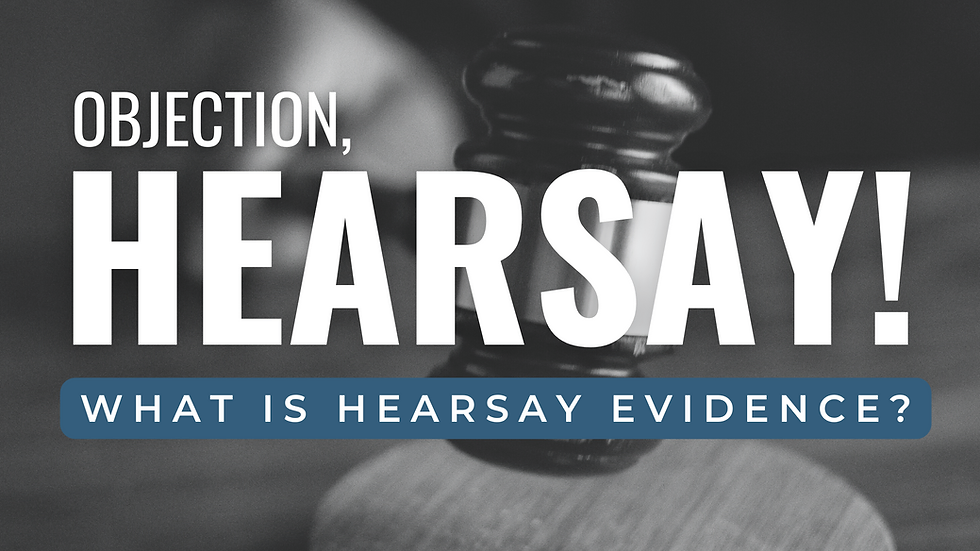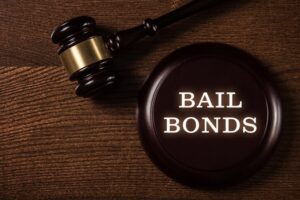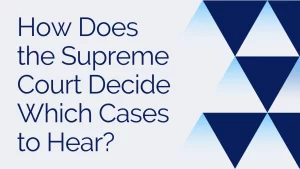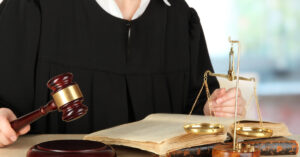what is hearsay in court
In the legal world, hearsay refers to an out-of-court statement that is offered as evidence for the truth of the matter asserted. The consideration of hearsay evidence in court is a complex and contentious issue, as it involves ensuring the reliability and fairness of the information presented. Understanding the various aspects of hearsay is vital for both legal practitioners and individuals involved in legal proceedings.
what does hearsay mean in court
At its core, hearsay is a statement made by a person out of court, which is later presented in court as evidence to prove the truth of the matter stated. This type of evidence is generally considered unreliable, as it may lack firsthand knowledge and can be prone to distortion or misinterpretation.
Breaking Down the Definition
A Statement – Spoken or Written
Hearsay statements can be communicated through spoken words or written documents, such as letters, emails, texts, voicemails, or official reports. Any statement made outside the courtroom falls under this category.
Out of Court Statements
For a statement to be considered hearsay, it must be made outside the courtroom. Statements made during the trial or hearing itself are not classified as hearsay.
Admissibility in Court
Hearsay evidence can only be considered if it is admitted into court proceedings. It is subject to rules of admissibility and may be excluded if it fails to meet specific criteria.
For the Truth of the Matter Asserted
The primary purpose of introducing hearsay evidence is to establish the truth of the statement. This means that the content of the statement is being offered as proof of the facts it contains.
Determining Hearsay in Context
The determination of whether a statement qualifies as hearsay often depends on the context in which it is presented. In some instances, statements that may seem like hearsay might not be treated as such due to the specific circumstances surrounding the case.
Contextual Considerations
To identify hearsay, it is essential to consider the context in which a statement is presented. The purpose for which the statement is offered and its relevance to the case are crucial factors.
Examples of Hearsay in Testimony
In testimony, questions or responses that refer to what someone else said are likely to be considered hearsay and may be subject to objection.
Identifying Hearsay in Documents
Various types of documents, such as letters, reports, texts, emails, and records, can contain hearsay statements. However, some exceptions may allow their admission into evidence.
Exceptions to Hearsay Rule
While hearsay evidence is generally excluded, certain exceptions exist that permit its admission under specific circumstances.
Documents and Their Exceptions
Documents like letters, texts, and reports can qualify as hearsay, but several exceptions, such as business records or dying declarations, may render them admissible.
Ensuring Admissibility
Lawyers must be well-versed in hearsay exceptions to ensure the admissibility of documents they wish to present in court.
Challenges and Controversies
Balancing perplexity and burstiness while maintaining specificity and context is a significant challenge in dealing with hearsay evidence.
Balancing Perplexity and Burstiness
Hearsay evidence can be complex and unpredictable, requiring careful analysis to determine its reliability.
Preserving Specificity and Context
Ensuring that the context and specific details of a hearsay statement are accurately presented in court is crucial for a fair trial.
Engaging the Reader: Hearsay in Real-Life Cases
Delve into real-life cases where hearsay evidence played a crucial role and explore its impact on the outcome of legal decisions.
Famous Hearsay Cases
Discover landmark cases where hearsay evidence significantly influenced the course of justice.
Impact on Legal Decisions
Understand how the admission or exclusion of hearsay evidence can shape the final verdict in court cases.
The Role of Hearsay Experts
Hearsay experts play a vital role in presenting, analyzing, and evaluating hearsay evidence in court.
Testifying on Hearsay
Experts may be called upon to testify about the nature and reliability of hearsay evidence.
Assessing the Reliability of Hearsay Evidence
Experts scrutinize hearsay statements to determine their trustworthiness and relevance.
Understanding Hearsay Exceptions
Explore common hearsay exceptions that allow certain out-of-court statements to be admitted as evidence.
Excited Utterance Exception
Learn about the circumstances under which spontaneous statements are considered exceptions to the hearsay rule.
Dying Declaration Exception
Discover how statements made by individuals on the verge of death can be exempted from the hearsay rule.
Business Records Exception
Understand the criteria that allow certain business records to be admitted into evidence despite being hearsay.
Balancing Justice and Fairness
Evaluating the weight and credibility of hearsay evidence is critical to maintaining a just and fair legal system.
Evaluating Hearsay’s Weight
Determining the probative value of hearsay evidence and its impact on the case is crucial in delivering a fair judgment.
The Role of Cross-Examination
Cross-examination is a powerful tool in challenging and scrutinizing hearsay evidence during trials.
The Evolution of Hearsay Rules
Tracing the historical development of hearsay rules and their evolution in modern legal systems.
Historical Perspective
Explore the origins of hearsay rules and their significance in ancient and medieval legal practices.
Contemporary Reforms
Understand the changes in hearsay rules in contemporary legal systems and their implications.
Navigating Hearsay Challenges
A look at the strategies employed by both defense and prosecution in dealing with hearsay evidence.
Defense Strategies
Examine the approaches defense lawyers use to challenge the admissibility and credibility of hearsay evidence.
Prosecution Perspectives
Understand how prosecutors present and support hearsay evidence in their cases.
Conclusion
Hearsay evidence is a fundamental aspect of legal proceedings, and understanding its complexities is vital for ensuring a fair trial. The intricate nature of hearsay calls for a delicate balance between perplexity and burstiness, while preserving specificity and context in presented evidence.
FAQs
What is the Hearsay Rule?
The hearsay rule refers to the legal principle that excludes out-of-court statements presented in court to prove the truth of the matter asserted.
Can Hearsay Evidence Be Admissible?
Hearsay evidence may be admissible if it falls under specific exceptions or meets certain criteria set forth by the court.
How Can a Lawyer Challenge Hearsay Evidence?
Lawyers can challenge hearsay evidence by objecting to its admissibility, presenting counterarguments, and cross-examining witnesses.
What Are Some Notable Hearsay Cases?
Some famous hearsay cases include Crawford v. Washington, Ohio v. Roberts, and Shepard v. United States.
How Do Hearsay Exceptions Impact Trials?
Hearsay exceptions can allow crucial evidence to be admitted in court, potentially influencing the outcome of a trial.







